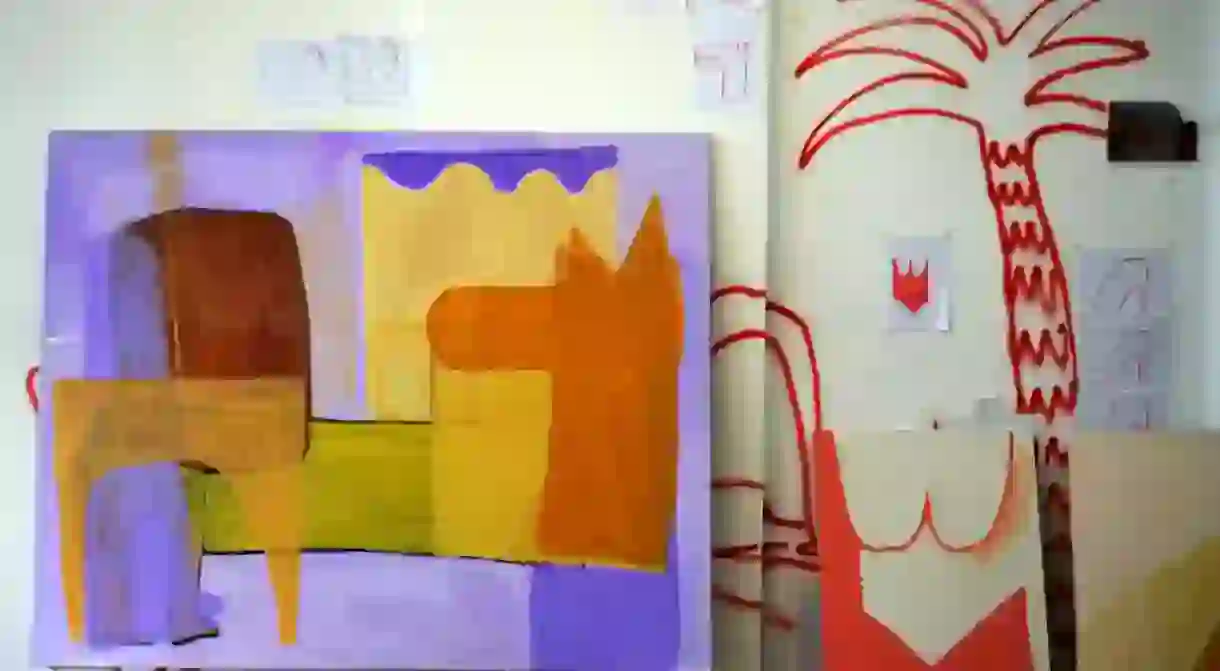Finding A Common Line, Aristeidis Lappas on the Emerging Athenian Art Scene

In spite of the location of The Breeder and Atopos CVC, the Mextagoueiro area in Athens doesn’t necessarily strike one as the place of a vibrant arts hub. Yet the city’s red light district has also welcomed a host of new artists that have moved to the area to make the most of cheap rents and sizeable studio space.
One such artist is Aristeidis Lappas, a rising star of the Athenian art scene. Located one street away from The Breeder, one of Athens’s most influential commercial gallery, Lappas’ studio is low key and unassuming. It stands between one of the areas pink-marked buildings and the busy Achilleos Street. Inside though there’s a different and more vibrant energy. Paint spattered floors and a spectrum of canvases in various stages of completion line the wall. Hip hop plays through the speakers and his dog meanders around the room, moving between the floor and the sofa. The large space is shared with fellow emerging artist Anastasia Pavlou.

Aristeidis creates bold, abstract paintings on large canvases. He blends organic shapes and more recognisable contemporary iconography – a paper coffee cup, red high heels – to create new narratives. Pop culture elements act, he tells Culture Trip, “as a punchline” to the stories and ideas within the painting, and narratives can range from the everyday to imagined scenarios. The viewer is asked to work with the paintings, making connections between the parts to bring the narrative to a whole. Titles such as Punctual Superhero reflect the playful side of his work. Having trained as an illustrator at Bristol, Lappas’ painting style blends graphic and street-art styles with more traditional silhouettes. At a recent exhibition at The Breeder, ‘Athens and Its Periphery’, Lappas exhibited large-scale abstract sculptures in bright pink, yellow and blue.

Last year saw more international attention on the Athenian art scene, for example when Documeta 14 (the influential art fair) came to the city. Yet in spite of numerous exclamations by the international media that Athens is the new Berlin, the art scene hasn’t seen a financial inflation to match the influx of hype. “I haven’t noticed or really met anyone that wants to buy Greek artists’ works”, said Aristeidis about current landscape for emerging Greek artists in Athens. He adds, “There’s a handful of galleries that have an international base”, but explains that a frustration for new artists is the lack of connection between young artists in Greece and the global art market.
Having studied in Bristol, Lappas represents a generation who moved to look outside Greece for development and opportunity during a time of crisis. Unlike many talented young Greeks who have stayed away, Lappas came back. Prior to the economic crash, there was a limited sphere for new artists to develop in. He explains that art universities in Athens had specific aesthetic stamps, which created a relatively singular style amongst graduates. “That was back then, but now I feel there’s more interaction with different scenes and different ideas.”

Almost ten years on from the crash, a fresh and febrile creative energy isn’t surprising. Did Documeta feel like the beginning of a new era? “I don’t know,” he says, taking a long pause. “It was a spark.”
Documenta has become something of a contentious issue amongst the artistic community in Athens. The organisers of the fair have come under criticism for not championing more Greek talent. “The thing that has stayed with me from the whole discourse, was that at some point someone asked ‘why didn’t you represent more Greek artists?’ The organisers said something like ‘our aim was not that to begin with, and if there is some underrepresentation from the Greek art scene, it’s the fault of the art scene and not our [Documenta’s] fault.”
“It is kind of harsh”, Aristeidis acknowledges, “but I get the point. The Greek art scene didn’t have much of a voice, which is completely understandable after all this shit that went down that went down,” he says, referring to the debilitating ramifications of the economic crisis in Greece. “You’re an artist, what the fuckk are you going to do. What’s anyone going to do?”

Lappas’ frankness reflects a tension that international creatives working in Athens don’t experience in the same way. While rent is cheap and opportunities are great for artists moving to Athens, local creatives face different and more complex challenges relating to voice, identity and representation – as well as having to find funding, and sustain a living. There is plenty of opportunity, and change is happening, but it’s slow.
For Lappas, the main challenge, is to find a united stance amongst the young Greek artists working in Athens. As he says, there is a need “to figure out a common place, a common line, between the artists working in Athens right now.”
“That’s the thing that needs to happen now,’ he says. ‘To figure out a common place, a common line, between the artists working in Athens right now. Especially the Greek artists. I feel like we have to take the stance that this is what we’re all going through and this is what unites us.”













